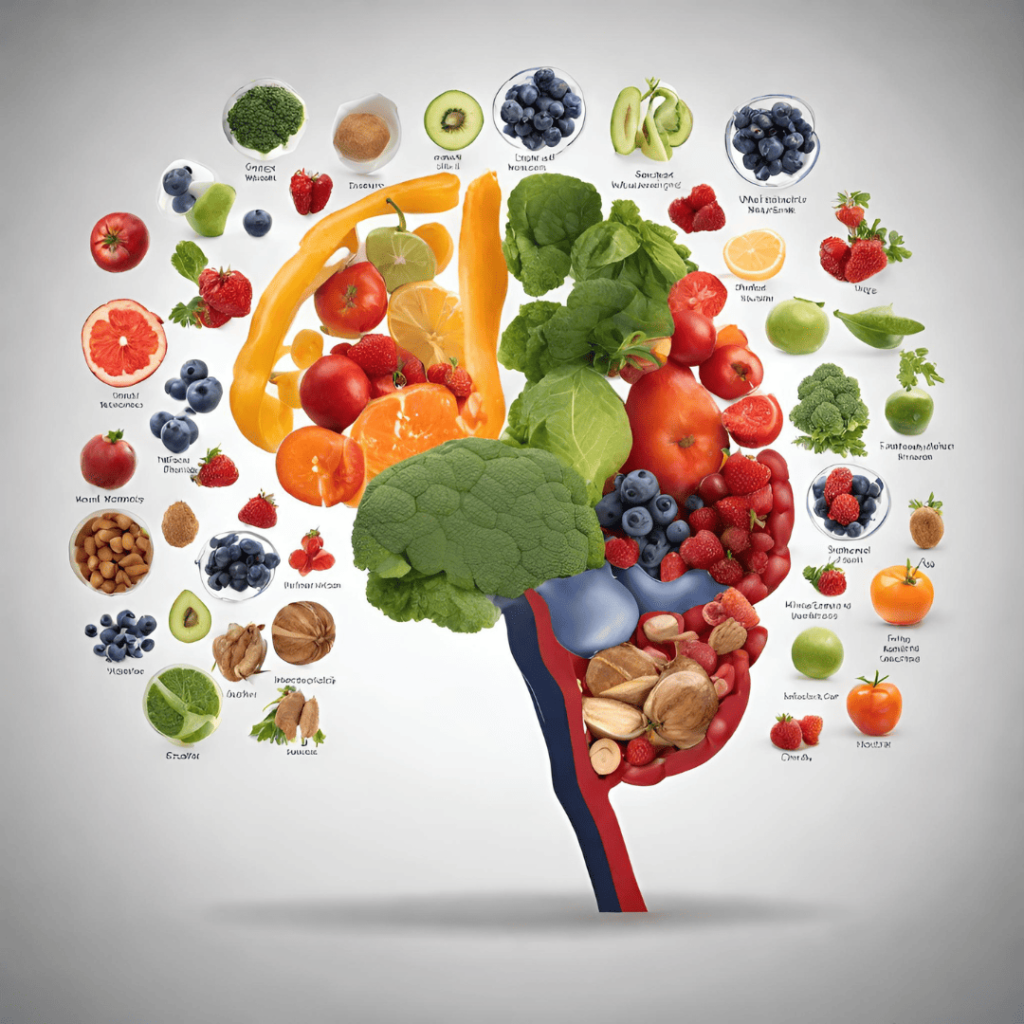Great Health Great Fitness
“Food for Thought: Inspiring the Nexus Between Nutrition and Mental Health”
Unlock the transformative power of nutrition on mental well-being with "Food for Thought: Inspiring the Nexus Between Nutrition and Mental Health." Explore the intricate relationship between diet and mental wellness, discovering how mindful eating can nurture emotional balance and cognitive vitality.

Introduction
In the intricate tapestry of overall well-being, the connection between nutrition and mental health emerges as a pivotal thread. This extensive exploration, “Food for Thought,” embarks on a journey into the profound relationship between what we eat and the health of our minds. Beyond mere sustenance, food plays a crucial role in nourishing not only our bodies but also our mental and emotional states. Join us as we delve into the latest research, unveil the impact of dietary choices on mental well-being, and provide practical insights to empower individuals to make informed nutritional decisions for a healthier mind.
https://www.ncbi.nlm.nih.gov/pmc/articles/PMC9441951/
The Gut-Brain Axis: Where Nutrition Meets Neurology
Explore the fascinating realm of the gut-brain axis, investigating the bidirectional communication between the digestive system and the brain. Uncover the role of gut microbiota in influencing mood, cognition, and mental health.
Explore the role of gut microbiota, the diverse community of microorganisms inhabiting the gastrointestinal tract, in modulating brain function and behavior. Examine the mechanisms by which gut bacteria produce neurotransmitters, metabolites, and other signaling molecules that influence mood, cognition, and emotional well-being.
Discuss the emerging research highlighting the impact of gut dysbiosis, an imbalance in the gut microbiota composition, on mental health disorders such as depression, anxiety, and even neurodegenerative diseases. Explore potential therapeutic interventions targeting the gut microbiome to promote mental wellness and alleviate symptoms of psychological disorders.
Examine the influence of dietary factors on gut-brain communication, including the role of prebiotics, probiotics, and fermented foods in supporting a healthy gut microbiota and promoting brain health. Discuss the concept of nutritional psychiatry and the growing recognition of diet as a modifiable factor in mental health management.
Nutrients for Neurotransmitters: Building Blocks of Brain Chemistry
Delve into the intricate relationship between specific nutrients and the synthesis of neurotransmitters. Explore how vitamins, minerals, and amino acids contribute to the delicate balance of brain chemistry.
Investigate the role of B vitamins, including folate, B6, and B12, in neurotransmitter synthesis. Explore how these essential nutrients participate in the conversion of amino acids into neurotransmitters such as serotonin, dopamine, and norepinephrine, which are involved in regulating mood, stress response, and cognitive function.
Examine the impact of minerals such as magnesium, zinc, and iron on neurotransmitter production and function. Discuss how these minerals serve as cofactors for enzymes involved in neurotransmitter synthesis pathways, highlighting their importance in maintaining optimal brain health and function.
The Impact of Sugar and Processed Foods on Mental Health
Examine the potential negative effects of excessive sugar and processed food consumption on mental health. Discuss the link between poor dietary choices and conditions such as depression, anxiety, and cognitive decline.
Explore the role of sugar in promoting inflammation and oxidative stress in the brain, disrupting neurotransmitter balance and impairing neuronal function. Discuss how excessive sugar consumption can lead to dysregulation of mood-regulating neurotransmitters such as serotonin and dopamine, exacerbating symptoms of depression and anxiety.
Investigate the effects of processed foods, which are often high in refined carbohydrates, unhealthy fats, and additives, on mental health. Discuss how the consumption of processed foods can contribute to systemic inflammation, insulin resistance, and dysbiosis in the gut microbiota, all of which have been linked to an increased risk of mental health disorders.
Omega-3 Fatty Acids: The Brain’s Best Friend
Highlight the importance of omega-3 fatty acids in supporting brain health. Explore sources of these essential fats, their role in cognitive function, and their potential benefits for mental well-being.
Delve into the specific roles of EPA and DHA in supporting brain function, highlighting their involvement in neuronal communication, neurotransmitter synthesis, and neuroinflammation modulation. Explore how these omega-3 fatty acids contribute to the maintenance of neuronal structure and function, promoting optimal cognitive performance, memory retention, and mood regulation.
Discuss the potential benefits of omega-3 fatty acids for mental well-being, drawing on evidence from epidemiological studies and clinical trials. Explore how higher intake of omega-3 fatty acids has been associated with reduced risk of depression, anxiety, and cognitive decline, as well as improved symptoms in individuals with mood disorders and neurodegenerative diseases.
Antioxidants and Mental Resilience: Nourishing the Brain

Investigate the role of antioxidants in protecting the brain from oxidative stress. Explore how a diet rich in colorful fruits and vegetables contributes to mental resilience and cognitive function.
Explore the diverse array of colorful fruits and vegetables that are rich sources of antioxidants, emphasizing the importance of incorporating a variety of these nutrient-dense foods into the diet. Discuss how vibrant hues in fruits and vegetables, such as deep greens, bright oranges, rich purples, and vibrant reds, signify the presence of phytonutrients with antioxidant properties.
Examine the specific antioxidants found in colorful fruits and vegetables, highlighting their unique benefits for brain health. Discuss how compounds like anthocyanins in blueberries, lycopene in tomatoes, and quercetin in apples exert neuroprotective effects by reducing inflammation, enhancing blood flow to the brain, and promoting the formation of new neurons.
The Mediterranean Diet: A Blueprint for Brain Health
Examine the components of the Mediterranean diet and its positive impact on mental health. Explore the synergy of olive oil, fish, whole grains, and plant-based foods in promoting cognitive well-being.
Dive into the abundant seafood consumption inherent in the Mediterranean diet and its association with improved mental well-being. Discuss the omega-3 fatty acids found in fatty fish like salmon, sardines, and mackerel, which play a crucial role in brain health by supporting neurotransmitter function, reducing inflammation, and promoting neuroplasticity. Explore the potential benefits of regular fish consumption for mood regulation, cognitive performance, and overall mental resilience.
Examine the emphasis on whole grains and their positive impact on mental health within the Mediterranean diet. Discuss how complex carbohydrates found in whole grains provide a steady source of energy for the brain, support serotonin production, and contribute to stable mood and cognition. Explore a variety of whole grains, including oats, quinoa, barley, and whole wheat, and their role in a balanced and brain-healthy diet.
Investigate the wealth of plant-based foods in the Mediterranean diet and their myriad benefits for mental well-being. Discuss the abundant intake of fruits, vegetables, legumes, nuts, and seeds, which provide a diverse array of vitamins, minerals, antioxidants, and phytochemicals essential for brain health. Explore the role of these plant-based foods in reducing oxidative stress, inflammation, and the risk of neurodegenerative diseases.
Nutritional Psychiatry: The Evolving Field of Food and Mental Health
Explore the emerging field of nutritional psychiatry, where researchers investigate the therapeutic potential of dietary interventions for mental health conditions. Highlight key findings and ongoing studies.
Dive into the burgeoning field of nutritional psychiatry, a discipline at the intersection of nutrition and mental health that explores the profound impact of dietary interventions on psychological well-being. Delve into the latest research findings, which underscore the intricate relationship between nutrition and mental health, shedding light on how dietary patterns can influence mood, cognition, and emotional resilience.
Explore groundbreaking studies that examine the therapeutic potential of specific nutrients and dietary patterns in preventing and managing mental health conditions such as depression, anxiety, and schizophrenia. Highlight key findings that reveal the beneficial effects of nutrient-rich diets, such as the Mediterranean diet, on reducing the risk of mood disorders and improving treatment outcomes.
Probiotics and Mental Wellness: Nurturing the Microbial Garden

Discuss the role of probiotics in supporting gut health and its implications for mental wellness. Explore the potential of probiotic-rich foods and supplements in promoting a positive mood.
Probiotics, often referred to as “good” bacteria, play a crucial role in maintaining a healthy balance of microorganisms in the gut microbiota. These beneficial bacteria contribute to digestive health by aiding in the breakdown of food, synthesizing essential nutrients, and preventing the overgrowth of harmful pathogens. However, emerging research suggests that the influence of probiotics extends beyond the gut, with implications for mental wellness and mood regulation.
Studies have demonstrated a bidirectional communication pathway between the gut and the brain, known as the gut-brain axis. This communication network involves various mechanisms, including neural, hormonal, and immunological pathways, through which signals are exchanged between the gastrointestinal tract and the central nervous system. Probiotics have been shown to modulate this gut-brain axis, exerting effects on neurotransmitter production, neuroinflammation, and stress response systems.
Dietary Patterns and Mental Health: Beyond Individual Nutrients
Examine the impact of overall dietary patterns, such as the Western diet vs. traditional diets, on mental health. Discuss the holistic approach to nutrition and its effects on mental well-being.
The Western diet, characterized by high intake of processed foods, refined sugars, unhealthy fats, and low intake of fruits, vegetables, and whole grains, has been associated with an increased risk of various chronic diseases, including obesity, cardiovascular disease, and type 2 diabetes. Emerging evidence also suggests that the Western diet may have detrimental effects on mental health.
Studies have linked the consumption of processed foods and sugary beverages to an elevated risk of depression, anxiety, and other mood disorders. These highly processed foods are often nutrient-poor and contribute to inflammation, oxidative stress, and dysbiosis in the gut microbiota, all of which can negatively impact brain health and emotional well-being.
Mindful Eating and Emotional Balance: A Holistic Approach

Introduce the concept of mindful eating as a holistic approach to nurturing mental and emotional balance. Explore the practice of being present with food and its potential benefits for overall well-being.
Mindful eating is a practice that involves cultivating awareness and presence during meals, allowing individuals to engage more fully with their food and the act of eating. It goes beyond simply focusing on what is being consumed to encompass the entire eating experience, including the sensations, thoughts, and emotions that arise during the process.
At its core, mindful eating is about developing a deeper connection to food and honoring the body’s signals of hunger and fullness. By slowing down and paying attention to the sensory aspects of eating, such as the taste, texture, and aroma of food, individuals can derive greater pleasure and satisfaction from their meals.
The Role of Nutrient Timing: Eating for Energy and Mood
Explore the concept of nutrient timing and its impact on energy levels and mood. Discuss the importance of balanced meals and snacks throughout the day for sustained mental vitality. Nutrient timing refers to the strategic planning of when to consume nutrients, such as carbohydrates, proteins, and fats, to optimize energy levels, mood, and overall well-being. It involves considering not only what nutrients are consumed but also when they are consumed in relation to physical activity, mental tasks, and daily routines.
Balanced meals and snacks throughout the day play a crucial role in maintaining stable energy levels and promoting mental vitality. Starting the day with a balanced breakfast, which includes a combination of carbohydrates, proteins, and healthy fats, provides a steady source of energy to fuel both physical and mental activities throughout the morning.
Nutrition and Specific Mental Health Conditions: Insights and Strategies

Delve into the relationship between nutrition and specific mental health conditions, such as depression, anxiety, and ADHD. Provide insights and dietary strategies that individuals can incorporate into their lifestyle.
For depression and anxiety, research indicates that certain nutrients play key roles in brain function and mood regulation. For example, omega-3 fatty acids found in fatty fish like salmon, walnuts, and flaxseeds have been linked to a lower risk of depression and may help alleviate symptoms. Similarly, foods rich in antioxidants, such as fruits, vegetables, and whole grains, have been associated with a reduced risk of depression and anxiety due to their anti-inflammatory properties.
Incorporating a variety of nutrient-dense foods into the diet, including whole grains, lean proteins, fruits, vegetables, and healthy fats, can provide the vitamins, minerals, and phytonutrients necessary for optimal brain function and mental well-being. Additionally, reducing the consumption of processed foods, refined sugars, and unhealthy fats may help support mood stability and reduce the risk of depressive and anxiety symptoms.
Culinary Herbs and Spices Flavorful Allies for Mental Health
Highlight the potential mental health benefits of culinary herbs and spices. Explore the unique properties of herbs like turmeric, rosemary, and lavender in supporting cognitive function and emotional well-being.
Conclusion
As we conclude this exploration of the intricate relationship between nutrition and mental health, it becomes evident that our dietary choices wield a profound influence on the health of our minds. From the gut-brain axis to the therapeutic potential of specific nutrients, the journey into “Food for Thought” underscores the importance of viewing food not just as fuel but as a powerful tool for fostering mental well-being.
By embracing a balanced and mindful approach to nutrition, individuals can empower themselves to make informed choices that support cognitive function, emotional resilience, and a thriving mind. May this exploration serve as a guide, inspiring a harmonious relationship between the food we consume and the health of our most vital organ—the brain. For more information you can check our blogs “The Impact of Social Determinants on Health Outcomes: Unraveling the Underlying Forces“.

[…] As individuals transition into adulthood, maintaining a balanced diet becomes vital for supporting overall health, preventing chronic diseases, and promoting longevity. Adult nutritional needs may vary based on factors such as age, gender, activity level, and health status. It’s important to focus on consuming nutrient-dense foods that provide essential vitamins, minerals, and antioxidants while limiting processed foods high in added sugars, unhealthy fats, and sodium. Adopting a balanced diet that includes a variety of fruits, vegetables, whole grains, lean proteins, and healthy fats can help support optimal health and well-being throughout adulthood. For More Information you can check our blogs “Food for Thought: Inspiring the Nexus Between Nutrition and Mental Health“. […]